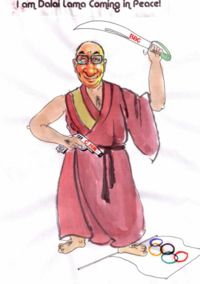Basic rundown in Chinese political theory
- China is not a democracy. The government of China does not act on the will of a majority but tries to impose the best possible solution.
- Before it was taken over by China, Tibet was impoverished and undeveloped. Under Chinese rule the people of Tibet have gained from improvements in education, sanitation, medicine, and basic needs.
- The reason some Tibetans are rejecting Chinese rule is because they want to return to this feudalism. But obviously the majority of ethnic Tibetans would not want that to happen because they enjoy the comfort which is brought by the Chinese.
Basic response from Tibetans
- While China has improved the lives of Tibetans, the Chinese concept of civilization, which is something like wiping out ancient practices and building a capitalist economy, is detrimental to Tibetan traditions.
- Tibetan practices and religion provide meaning to the lives of locals and should be defended, not attacked.
- Pre-civilized Tibet worked without failing for a thousand years and is likely more stable than globalization in the long run.
- An independent Tibet would not necessarily return to feudalism. What is wanted by the Tibetans is not necessarily a political secession from China but merely greater room for self-rule and segregation from ethnic Chinese and other foreigners, which are admittedly now a sizable minority in Tibet.
Basically this is a problem of determining which human rights should be defended by the state. But now there are other problems too: Tibetans can no longer self-segregate from the Chinese living in their midst, and some Tibetans prefer the "civilized" system!
So this issue is not as clear-cut as a "Free Tibet" bumper sticker would have it. It would be much easier to decide these issues if Tibet were totally independent but that can no longer happen due to the ethnic Chinese population. So, having thought that through, while I cannot agree with the ethnic Tibetans who want total independence, I agree with the Dalai Lama's proposal of compromise, a form of autonomy which was given to Tibet from 1951 to 1959:
http://news.bbc.co.uk/2/hi/asia-pacific/7305558.stm
http://www.tibet.com/NewsRoom/compromise.htm
Use of Orientalism
Both the Chinese and Tibetans employ Orientalism to defend their political positions to outside powers. The Chinese use a modern, globalist narrative of negative Orientalism, depicting Tibet as a "backwards" feudal society that was industrialized and modernized by the freedom-loving Chinese people. Some Tibetans, specifically the Dalai Lama, respond with a positive Orientalism that emphasizes Tibet's Buddhist culture to portray it as a "peaceful nation"--i.e., a Shangri-La of noble savages-- that was invaded and colonized by capitalist imperialists. Obviously, these narratives attract different sides of the American political spectrum. Neither is useful for going forward politically.
Tibetans: the Chinese Jews
Little-known fact: PRC Chinese believe, absurdly, that Tibetans control the Western media.
![[Everything Shii Knows]](../mediawiki/skins/common/images/wiki.png)
